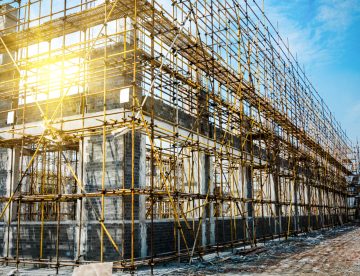
As more than 400 tax workers join other professions in the recent wave of UK strike action, construction workers have reported serious issues in their attempts to communicate with the HMRC construction Industry Scheme (CIS).
Although online verification doesn’t appear to have been affected, callers to the CIS helpline have faced long delays with some reporting being cut off during their attempts to speak to someone. Find out more in this week’s blog.

Over the past few months, we’ve witnessed a race in the launch of Artificial Intelligence (AI) technology that has been trained to interact with humans in a conversational way.
Natural language models like Open AI’s ChatGPT and Google’s Bard can produce pieces of creative writing, translate copy, summarise lengthy texts, access vast amounts of data to answer queries and have a human-like conversation. Whilst experimenting with these technologies can be both useful and fun, this has got us wondering whether AI might soon be taking on other creative work such as designing a building (or perhaps it is already)? Take a look at what we found out in this week’s blog.

Known as ‘Twelfth Night’, today officially marks the end of the festive period. For most people, this means that the lights and decorations will have been packed away, the chocolate box will be reduced to a few strawberry creams and normal working/ school days will have resumed.
While the return to a normal routine can feel like a natural comfort zone, for many people the prospect of the cold, dark winter months ahead can bring a dose of the blues and a lack of motivation that affects their personal and working lives.
If that’s you right now, here are a few tips for how you can stay motivated at work this January.

Whether it’s a small-scale conversion project or a large commercial development, the contractors and sub-contractors involved will have an impact on the community they’re entering into.
In all likelihood, the work will be carried out in a location where some people live, work or spend their leisure time and that means there are several areas of concern which should be taking into consideration – particularly the appearance of the site, noise control and the logistical arrangements.
How members of the public react to these impacts will largely depend on how well a contractor engages with them. So, in this week’s blog, we’re exploring why keeping good relationships with local communities is so important to the success of any building project and what can be done to maintain a reputation as a considerate contractor.

Across the world, it’s estimated that around 1.5 billion vehicle tyres are discarded every year. Most of us have probably never really thought about this or what might be happening to such a mountain of tyres once they’ve been cast off. While some may get strung up to a tree to make a swing, such repurposing is really an exception to the rule. In fact, less than one percent of old vehicle tyres are ever reused, meaning huge quantities wind up in stockpiles and landfill.
Now, researchers from the University of South Australia (UniSA) have come up with something that could not only help to resolve the landfill problem but also provide an economically viable and sustainable alternative to concrete for the construction industry. Read this week’s blog for more about this exciting development.

In new rules which came into place on Friday 1st April, the government has stated that construction firms in the UK can no longer use red (rebated) diesel for site plant and machinery.
Brought in as part of the search for policies which will help the country hit its net zero target by 2050, this would seem like a good thing. However, looking at the impact this is likely to have on construction companies in the current economic circumstances, many in the industry are calling this ‘the right policy at the wrong time’. Here’s what you need to know…

With the news headlines moving slightly away from the coronavirus pandemic into an almost daily dose of woe about the energy market crisis, in today’s blog we’re looking at what effect this might have on construction.
While Sheriff Construction and other building contractors like us do not use very much natural gas in our day-to-day work, the problem is that our suppliers do. Manufacturing the materials we use is often energy intensive and, with the hike in the price of gas, it’s inevitable that those costs will start to pass through the procurement process. One leading economist is warning the industry to be prepared for a ‘phase of rising prices’ in bricks, cement and concrete. Read on for more information.

In case you missed it, Rishi Sunak presented the government’s Spring Budget yesterday. Unsurprisingly, the global pandemic and the billions of pounds of national expenditure that it has made necessary dominated what Sunak had to say. There were also several announcements which will undoubtedly have an impact on construction. To save you time, in this week’s blog, we’ve picked out some of the key measures.

Increased workloads, rising stress levels, imbalances caused by remote working, untaken leave and the risk of burnout. These are all issues which are affecting many workers as a result of the pandemic. If you’ve not taken much of a breather this year, why not use the Christmas break as an opportunity to truly switch off, relax and unwind. Read on for some tips on how to do just that.

Second only to packaging in generating an estimated 50,000 tonnes of plastic waste each year, it’s clear that plastic is still a big problem for the UK’s construction sector. Of course, it’s the very thing that makes plastic desirable (it’s durability) which is what also causes the biggest issues. With so much plastic waste ending…
